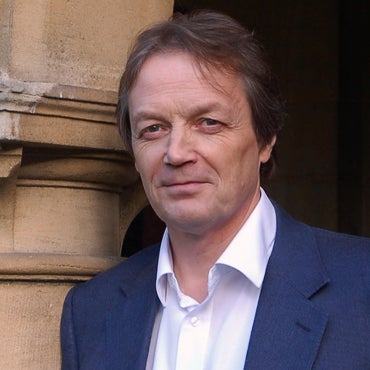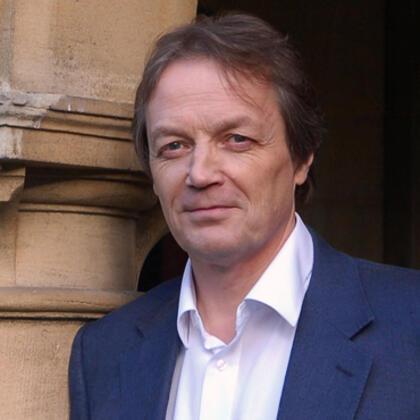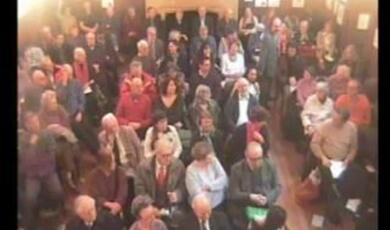Medieval Music: To Chant in a Vale of Tears
Share
- Details
- Transcript
- Audio
- Downloads
- Extra Reading
According to one early-medieval author, ‘there are many who are moved by the sweetness of singing to bewail their sins, and who are readily brought to tears by the sweet sounds of a singer’. A thousand years later, Hector Berlioz tells how a musician was so moved during the performance of an opera that ‘two streams of tears burst violently from his eyes, and he wept so hard that I was compelled to lead him out of the hall’. Tears and music have a long history together, but a show of tears means different things at different times. The purpose of this lecture is to explore the nature of a lachrymose response in the medieval experience of music.
A short introduction to the topic of this lecture is offered in the following short video by Professor Christopher Page:
Download Transcript
07 January 2016
Medieval Music:
To Chant in a Vale of Tears
Professor Christopher Page
It has often been said that that the Middle Ages were actually one age: the Age of Faith: of the great cathedrals, of the crusades. We imagine, perhaps, monks, nuns and clergy bent over those tightly written bibles that we have seen under glass in an exhibition, perhaps, or reproduced in a book. Yet those same men and women spent as much time, and perhaps more time, singing their bibles as reading them. This they did in various forms of chant, or psalmody if you prefer, for the mass and Offices, using words taken or adapted from Scripture. This means that many passages of scripture were associated with a particular curve of melody as surely as the words Dominus vobiscum are for anyone who knows the Latin rite as it survives today. So although the page of that medieval bible seen under glass may now seem a very silent thing, there was actually a glimmer of latent melody around many words and phrases for those who experienced the liturgy year by year.
Experience showed the medieval singer that music sometimes carried the divine word to a greater depth in the listener than the speaking voice could alone, and more deeply than a passionate homily or an erudite gloss. Let me introduce you to Isidore of Seville, a scholar and bishop that only specialists have heard of now, but a book which he compiled, entitled the Etymologies, was widely read for a thousand years. He died in 636 and lived, as his name indicates, in Visigothic Spain: a kingdom which was still, in many respects (and notably those that impinged on the life of a bishop) a very late-Roman Spain. Bishop Isidore heard readers and singers at work in his cathedral almost every day when he was in residence; he believed that readers had the power to 'announce' the teachings of scripture to the people, but that singers could 'excite the minds of their hearers to compunction'. I will return to that word; for the moment it is enough to register that it means a sharp pain, and as you will remember from childhood, or perhaps more recent events, a sharp pain can bring tears to the eyes.
An educated citizen of ancient Rome was free to regard musicians as no better than slaves, but Christian monks and clergy were not. No bishop, abbot or abbess could afford to neglect the acknowledged power of music to move. They inherited, through the Book of Revelation, to look no further, the concept of paradise as an end-time temple where men and angels sang perpetual praise in ecstasy. Death was the portal to eternal symphony in Heaven or everlasting stridency, with tears and gnashing of teeth, in Hell. The blessed would certainly sing in heaven, with the angels, and if you heard my second lecture you may remember that, on many occasions, men and women were able to overhear the angels singing chants from the earthly liturgy.
The question of how music moved the listener seemed a pressing one to many minds in the Middle Ages, not only because the effect could be remarkable but also because there was – as there still is – something deeply mysterious, and therefore something beyond regulation or control, in the way music achieved in its effects. To recognise, as Isidore of Seville and many others did, that music could evoke compunction in those who found themselves unmoved (or less moved) by the words of scripture alone, was to acknowledge a challenge to the supremacy of the rational powers embodied in language and grammar: the supremacy, if you like, of the Word.
My title today, 'To chant in a Vale of Tears', alludes to one of the most famous of all medieval Latin plainsongs, the Salve Regina. You have a translation of this, one of the great expressions of penitential piety, on the first page of your handout.
Hail, holy Queen, Mother of Mercy,
Hail, our life, our sweetness and our hope.
To thee do we cry,
Poor banished children of Eve;
To thee do we send up our sighs,
Mourning and weeping in this vale of tears.
Turn then, most gracious advocate,
Thine eyes of mercy toward us;
And after this our exile,
Show unto us the blessed fruit of thy womb, Jesus.
O clement, O loving,
O sweet Virgin Mary.
Salve regina.
With that chant in our ears, so inviting to an affective performance with its rhetorical and sighing address ('O clement, O loving, O sweet Virgin Mary') we can well understand why medieval writings contain observations about the power of certain chants to seem redolent of certain emotional states even though medieval singers sang but did not exactly perform, and even though they heard, but did not exactly listen. On the whole, their comments are reassuring in the sense that they do not try finally to resolve the question of what actually happens when we are moved. Modern researchers, in contrast, have proved rather more curious, and there is now a large body of research devoted to the mystery of human responses to music, and especially to the subject of music and emotion that has gathered momentum with contributions by specialists in neurology and psycho-acoustics. Much of this work is very stimulating; especially if one believes that Magnetic Resonance Imaging of the brain (MRI) will have much to reveal in the coming years, but very little of it is historical. The time therefore seems ripe for asking how we might explore the question of emotion and musical response in the Middle-Ages.
We know very little about the ways in which the men and women destined to become liturgical singers were socialised in the early years of life, or how their emotions were formed by interaction with their parents and by play. Once they assumed the various forms of life they had chosen, or which were chosen for them, and began the business of learning and singing their chant, they were neither musicians, as we might immediately understand the term today, nor an audience. As I said a moment ago: they sang, but did not always exactly perform; they heard, but did not always exactly listen. Nor exactly, did they have composers. The term 'Gregorian chant', which we all know, associates a good deal of the oldest plainsong with a pope named Gregory (usually taken in the Middle-Ages to mean Gregory the Great who died in 604) yet even the most determined admirers of Gregory saw him as a divinely inspired maker, editor and redactor of chant, not as a fountainhead for the entire repertory. When monks and clerics began to compose new chants for local saints, as they did intensively from the tenth century onwards, they often attributed the Gregorian music to anonymous 'old masters' in the plural. For the most part there was no composer: no controlling subject of the kind that many studies of music and emotion take as a given.
I would like now to introduce you to one of the most articulate musical commentators of the Middle-Ages. He is known to us only as John, and he was a monk writing in a corner of what is now Belgium (to be precise, the area is now Flemish Brabant) somewhere around 1100. He gives his opinion on various chants, and their effects, but he knows there are no simple answers; he even describes how he himself sang some chants to a company and that what some greatly approved others found distasteful. One of the plainsongs he discusses is the antiphon Rex autem David, and I would like to dwell on that a little. The text is based on David's lament for his third son Absolom, as recounted in the second book of Samuel (18, 33). According to John, this chant 'seems to make lamentation audible in not only in the words but also in the chant'. Let us see if you agree. You have the text on the first page of your handout (I will explain the curious layout in a moment):
Rex autem David,
cooperto capite incedens,
lugebat filium,
dicens:
Absalon, fili mi,
fili mi, Absolom!
Quis michi det
ut ego moriar pro te,
fili mi, Absolom?
You also have the translation: King David, walking with covered head, mourned for his son, saying: "O Absolom, my son, O my son Absolom. Who may grant me that I may die for thee, O my son Absolom"? As you can see, there is a brief narrative introduction, and then the text becomes a soliloquy by King David as he expresses his grief for the loss of Absolom.
Here now is the music:
Rex autem David
How might we begin to understand what John means by saying that this chant 'seems to make lamentation audible in not only in the words but also in the chant'. We could make a start with the Latin text which I invite you to glance at again. Given that it is very short it is, to say the least, notably rhetorical; I have mapped some of the more obvious features on your handout. There are repetitions, as if to evoke the obsessive circling around the source of grief as when one says 'Oh why, why?' Here it is:
fili mi, fili mi, Absolom…fili mi, Absolom.
There is also a bitterly rhetorical question ('Who may grant me that I die for thee'?) There is also alliteration:
cooperto capite
and there is internal assonance
incedens…dicens
You have perhaps already spotted the striking chiasmus:
Absolom, fili mi, fili mi, Absolom.
All of this, I think, is designed to suggest powerful feeling as speech circles around the core of grief without finding release, and as emotion creates eddies and patterns in what is said.
Now for the music.
Medieval singers classified their chant into eight modes; you might think them as scales of eight notes starting at various points using, with just in exception, the white keys of your piano. But that does not really explain what a mode is; a mode is actually a notion of what the materials of that scale can be made to do in particular patterns of musical meaning. Our author John ascribes particular characters to these modes, and he describes number seven, the mode of our chant, as 'doleful'.
Here is that mode as a scale (A)
I think you will agree that does not sound very doleful; it is our major scale! But that is because we are not hearing it correctly. For John, the main structural note is actually four notes up the ladder: I will ask Chris to sing the scale again, but pausing on the structural note (B). That is now starting to sound rather different. Now I will ask Chris to add a pause on another important note in chants of this mode (C). Now you can begin to see how a mode is really about the meaning of musical patterns and the different eight that notes bear. Chants of the mode we are considering, mode 6, have a common tendency to these long, falling phrases that wind their way down tending not to skip but moving by step as if there is a heaviness, a want of energy and zest (D). That was actually an extract from our chant (E).
The curious appearance of the Latin on your handout is designed to show the way the music articulates the sense with it pauses. You can see how carefully the music follows the grammatical structure, and you will be able to hear that when I shall ask Chris to sing it again in a moment. And here is another thing: you will hear that the melody cunningly rises to its peak on the word lugebat, meaning 'he lamented', and never touches that point again. It also leaps there, the only time in the chant it does so, as grief lends if not energy then at least a desperate insistence:
Rex autem David: second performance
Rex autem David,
cooperto capite incedens,
lugebat filium,
dicens:
Absolom, fili mi,
fili mi, Absalon!
Quis michi det
ut ego moriar pro te,
fili mi, Absolom?
There is one term that was often used by medieval writers to describe a strong emotional response to chant: compunctio, or 'compunction'. Compunctio is related through its Latin parent to modern English 'point', 'puncture', 'pungent', 'poignant' and of course 'compunction'. The literal meaning is of a pricking or stinging sensation: sharply physical, it carries a reminder of being in the body, as Christ was when pierced in the side, at precisely the moment where the spirit is newly stirred into life and may long for release from the muddy garb of flesh. The clergy and those living a common life in the Middle-Ages, notably monks and nuns, built their sense of existence, upon the consequences of Adam's transgression which, to adapt the words of John Donne, was their sin though it were done before. One of their most important tasks was the choral praise of a divinity deemed utterly important to their eternal wellbeing and utterly beyond their power, but not deaf to their petition. Their prayers, readings and plainsong enhanced their sense of vulnerability to God's prerogative: he gave the ultimate gift of blessedness and could impose the ultimate penalty of damnation. Their profoundest hopes were compounded with the deepest of all possible fears. This is not to say that singers spent their lives in a hyper-emotional state; they certainly did not, which is why a great deal of medieval writing is designed to reawaken torpid and indifferent spirits to a sense of their predicament. But the performance of plainsong certainly could induce sudden moments of emotion when singers felt their vulnerability – their predicament on the long march to doomsday – with exceptional force.
Compunction was the name for that experience when induced by listening to chant or performing it. Chief among its manifestations was a flow of tears, which you will remember from the Salve Regina. Perhaps that should not surprise us. Nietzsche once declared that he could not 'differentiate between tears and music'. One influential writer on lachrymose emotions quotes that remark and adds, perhaps a trifle dogmatically, that anyone 'not immediately struck by the profundity of [Nietzsche's] statement has not lived for a minute in the intimacy of music.' For myself, I do not find the matter quite so clear, and I stand rather with Tennyson: 'Tears, idle tears/I know not what they mean': the meaning of tears in any state of civilization has to be assessed, it cannot simply be assumed.
I would like to consider two passages in which living 'in the intimacy of music' inspires a lachrymose response. They were written a thousand years apart, in the ninth century and the nineteenth. The first is by a Frankish singer, named Grimlaic, who had served as a cantor or soloist in the abbey of St. Arnulf in Metz. His memory was honoured at the famous island abbey of Reichenau, in Lake Constance, perhaps because he had trained the singers there. He flourished in the early 800s, when the drive to consolidate and extend what is often called the Carolingian renaissance was at its height. This was a period, surely the first of its kind in European history, when the most exalted powers of government regarded even the lowliest techniques of literacy – spelling, accurate copying, and clear handwriting – as part of their charge. One of the tasks facing the Carolingians and their servants was to clarify the terms of the religious life. What is a cleric, and how should a cleric live? What is a monk, and how should a monk live? The last of those questions is the one posed by Grimlaic in a guide to a strict form of the monastic life that he compiled, entitled A Rule for Solitaries. This is what he has to say on the matter of chant:
Childish games and laughter do not delight us but holy readings and the spiritual music of melody instead. However hard-hearted we are, and unable to produce tears, our hearts are turned to compunction when we hear the sweetness of chant. There are many who are moved by the sweetness of chant to bewail their sins, and readily brought to tears, by the sweet sounds of a singer.
Now I turn, perhaps somewhat unexpectedly in this context, to Hector Berlioz. In a collection of reminiscences entitled Nights in the Orchestra, Berlioz describes how he conducted a performance of Gluck's opera Iphigénie en Tauride. When it came to the aria O malheureuse Iphigénie, a setting which Berlioz admired for what he calls its 'antique hue, so evocative of the simple heroic grandeur of Homer', one of the players, named Cosino, gave up the struggle with his own feelings. According to Berlioz:
When Iphigénie reached the aria O malheureuse Iphigénie, whose classical hue, and solemn accent, with melody and accompaniment so fittingly desolate, recalling the sublimities of Homer, the simple grandeur of the heroic ages, filling the heart with that incalculable sadness to which the evocation of a vanished time always gives rise, Cosino, growing pale, ceased playing. He rested his elbows on his knees and hid his face in both hands, like one engulfed by an inexpressible feeling. Little by little, I saw his breathing become more difficult, the blood rushing to his temples reddened, and at the point where the women's choir entered with these words Mêlons nos cris plaintifs à ses gémissements… two streams of tears burst violently from his eyes, and he wept so hard that I was compelled to lead him out of the hall.
Berlioz is quite specific about the music that induced the tearful reaction he observed; the sense of a composer as the fountainhead of music and of its emotional effects could scarcely be sharper. Berlioz believes he can explain the musician's reaction in terms of qualities in the score and the story recounted in the opera. Nonetheless, he cannot say what the experience actually means in terms of its moral consequence or spur to future action. It clearly sustains the romantic notion of artistic genius as an overwhelming force, but there seems to be no social convention for regulating what should happen when an unusually emphatic form of surrender, a tearful collapse, actually occurs. Berlioz has no choice but to lead the sufferer out of the hall. Grimlaic, in contrast, is referring in general terms to the entire repertoire of plainsong for the liturgical year: to a 'spiritual music of melody' which seems to pervade antiphons, responsories, graduals, offertories and all genres of chant at once without considerations of genre, musical structure, liturgical occasion or solo as opposed to choral performance. Far from being an encumbrance to proceedings, a singer who reacted tearfully would surely enhance his connections with others, would find his importance to the common project of worship magnified, and would know that his condition had a name: compunction in this vale of tears, Listen to the Salve regina again:
Salve Reginaagain.
Who is singing that? The simple answer is Chris Watson. But it seems to be all the faithful: Mary is our sweetness and our hope, we the poor banished children of Eve. This is Everyman singing: all of us. When someone sings it, they sing it for themselves and on our behalf. But inRex autem David, it was very much one person at issue, King David: O Absolom, my son, O my son Absolom. Who may grant me that I may die for thee, O my son Absolom"?
In recent years, some psychologists of music have proposed that music moves us by evoking a nebulous human subject whose inner life is somehow happening in the music for us to experience in a uniquely intimate way. One has called this 'the thesis that, in hearing expressiveness in music, we sometimes imagine a persona who is subject to a narrative' that unfolds in the musical sound. This sense of a personage can be markedly enhanced when the music functions in a narrative context, or when it carries a text that voices the thoughts of a participant in one. In a famous study the ethnologist Jean Briggs reveals how she spent a long period with the Uktu tribe of Eskimos and found that her principal informant, Inuttiaq, became deeply attached to Verdi's opera Il Trovatore when she played a recording to him. He had never heard it before, and he described it as 'music that makes one want to cry'. I doubt very much whether this demonstrates the universality of the musical values embodied in Romantic opera. I suspect that Briggs told Innutiaq the story of tragic love and death that lies behind the façade of that great work so insouciantly, and therefore so deceptively, called 'the troubadour'. He filtered his perception of the music through that narrative screen.
The great majority of plainsongs have words drawn or adapted from the bible, and Scripture is often emphatically narrative, as in many book of the Old Testament, or it is dramatic in the strict sense that people are speaking, often with great vehemence. There are impassioned soliloquies and many passages, notably in the book of Psalms, which confront the most exalted and the most abased feelings associated with King David, so intensely visualised in medieval painting and sculpture. A monastic or clerical singer of the Middle-Ages helped David bare his soul one hundred and fifty times a week by singing the 150 psalms in the course of seven days. Grimlaic, writing in a long tradition of monastic instruction where the work of psalmody, especially in the strict sense of rehearsing the Psalter, as regarded as a vital discipline to promote self-scrutiny through an identification with the plight of King David, one so profound that the psalms become the monk's own prayers. This is as clear as day in one of the earliest monastic writers of the West, John Cassian: he insists that a monk should 'take into himself all the disposition of the psalms…he will begin to repeat them and to treat them in the profound compunction of heart, not as if they were composed by the prophet David but as if they were his own utterances and prayer'.
Now we understand better what John meant when he said Rex autem David seems to give sound to lamentation. "O Absolom, my son, O my son Absolom. Who may grant me that I may die for thee, O my son Absolom"? That is not a psalm, but you cannot expect to find David baring his soul more candidly or intensely than that. Plainsong was a repertoire of music with texts embedded in a wealth of scriptural narrative; love, loss and death loom large that become the singer's own reflection on sinfulness and death. I am reminded one last time of Gluck's opera Iphigénie en Tauride with its tragic lament sung by the heroine. Being moved by plainsong in the Middle-Ages often meant responding to the aria of a suffering character in the grand opera of salvation history that we call the liturgy.
© Professor Christopher Page, 2016
This event was on Thu, 07 Jan 2016
Support Gresham
Gresham College has offered an outstanding education to the public free of charge for over 400 years. Today, Gresham plays an important role in fostering a love of learning and a greater understanding of ourselves and the world around us. Your donation will help to widen our reach and to broaden our audience, allowing more people to benefit from a high-quality education from some of the brightest minds.


 Login
Login









